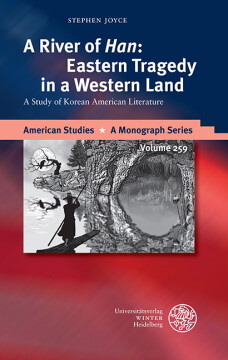
BUCH
A River of ‘Han’: Eastern Tragedy in a Western Land
A Study of Korean American Literature
American Studies – A Monograph Series, Bd. 259
2015
Zusätzliche Informationen
Bibliografische Daten
Abstract
Is there a non-Western form of tragedy? This volume argues that the Korean concept of han should be considered an Eastern tragic vision which is gaining prominence in the West through the critically acclaimed works of diasporic writers such as Nobel Prize-nominee Richard E. Kim, Theresa Hak Kyung Cha, and Chang-rae Lee. Through close readings of the works of leading Korean American authors, the book explicates the philosophical, historical, and postcolonial roots of ‘han’ and its distinctive aesthetics in contrast to classical Western tragedy. It then examines how specific authors deploy this concept to portray the cultural conditions of Asian Americans and offers powerful insights into the interplay of cultural memory and aesthetics. Finally, the tragic vision offers a counterpoint to many of the optimistic visions of social change that underpin contemporary theories of ethnic or postcolonial fiction and offers a critical perspective on foundational theoretical assumptions.
Inhaltsverzeichnis
| Zwischenüberschrift | Seite | Aktion | Preis |
|---|---|---|---|
| Contents | 5 | ||
| Acknowledgments | 7 | ||
| 1 The River | 9 | ||
| 1.1 Asian American Studies | 15 | ||
| 1.2 Journey’s Beginning | 32 | ||
| 2 The Whirlwind of "Han" | 37 | ||
| 2.1 Richard E. Kim | 38 | ||
| 2.2 "The Martyred" | 43 | ||
| 2.3 Echoes of "Han" in Religion and Philosophy | 67 | ||
| 2.4 "The Innocent" | 73 | ||
| 2.5 Conclusion | 90 | ||
| 3 The Colonial World of "Han" | 91 | ||
| 3.1 Postcolonial Theory and Homi Bhabha | 92 | ||
| 3.2 "Lost Names" | 99 | ||
| 3.3 The "Han" of Lost Names | 115 | ||
| 3.4 Conclusion | 121 | ||
| 4. A Fugitive Aesthetic | 127 | ||
| 4.1 Theresa Hak Kyung Cha | 136 | ||
| 4.2 "Dictée" | 138 | ||
| 4.3 Conclusion | 196 | ||
| 5 "Han" in the Interstices | 202 | ||
| 5.1 Heinz Insu Fenkl | 204 | ||
| 5.2 An Autobiographical Novel | 206 | ||
| 5.3 Camptown as Contact Zone | 223 | ||
| 5.4 Autoethnography | 242 | ||
| 5.5 Conclusion | 248 | ||
| 6 A Labyrinth without a Centre | 250 | ||
| 6.1 Chang-rae Lee | 252 | ||
| 6.2 "Native Speaker" | 257 | ||
| 6.3 "A Gesture Life" | 290 | ||
| 6.4 "Aloft" | 318 | ||
| 6.5 Conclusion | 341 | ||
| 7 Trauma, Tragedy, and "Han" | 344 | ||
| 7.1 "Han" and Tragedy | 353 | ||
| 7.2 Some Characteristics and Literary Strategies of "Han" | 363 | ||
| 7.3 The Truth of "Han" | 366 | ||
| 8 Journey’s End | 378 | ||
| Works Cited | 385 |


 Powered by CloudPublish
Powered by CloudPublish